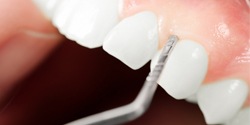Gum Disease Therapy – Denton, TX
Protecting Your Oral and Overall Health

Did you know that gum disease affects around 50% of the current US population? This incredibly common problem can lead to permanent damage and even tooth loss. Thankfully, at Denton Dental Center, Dr. Todd Balington and his team are experienced in detecting and treating gum disease. The early detection of gum disease can prevent you from dealing with much more serious issues in the future. Keep reading to learn more about his problem and how gum disease treatment in Denton is vital for your health.
What is Gum Disease?

Gum disease is an infection of the gums and supportive tissue. Typically caused by plaque and tartar buildup as a result of poor oral healthcare, gum disease can lead to damage of your gums, supportive tissue, tooth loss, and even more serious health risks. Fortunately, the beginning stage of gum disease is reversible through good oral healthcare and routine dental visits. That’s why it’s important to know the warning signs so you can seek treatment for the disease before it causes permanent damage.
While the main cause of gum disease is poor oral healthcare, your risks increase if you smoke or use tobacco, drink alcohol heavily, have a history of gum disease, or have immune disorders.
What Are the Symptoms of Gum Disease?
Because recognizing the symptoms can save your smile, here are some of the most common signs of gum disease:
- Red or puffy gums
- Gums that bleed easily
- Tender or swollen gums
- Persistent bad breath
- Small pockets beneath your gums
- Painful chewing
- Change in bite
If you notice any of these symptoms, call our office right away. Dr. Balington will examine your gums and mouth to decide your next steps towards positive health.
How Can Gum Disease Affect My Health?

While gum disease can cause damage to your gums, supportive tissue, and teeth, it has also been linked to increased risks of heart disease, stroke, diabetes, cancer, immune disorders, and even Alzheimer’s. Specifically, studies have shown that gum disease can increase your risk of cardiovascular disease and related problems by 20%. With studies continuing to pile up linking your gum health to your overall wellbeing, routine dental checkups and cleanings are vital to ensure the health of your gums.
How is Gum Disease Treated?

Dr. Todd Balington’s main way of treating gum disease is a treatment called scaling and root planing. With this procedure, he will clean away plaque and tartar that has been collecting on your smile. He will carefully remove these gum-disease causing substances from above and below your gumline. Then, he will smooth out your tooth roots below your gumline to make it much harder for plaque and bacteria to collect in the future. This simple yet affective treatment, also called a deep cleaning, can save your gums from permanent damage and the risks that this disease can cause.
Gum Disease Therapy FAQs
Dr. Balington, your dentist in Denton, and Dr. Karim, our on-staff periodontist, are ready to help you find freedom from gum disease. Before you request an appointment with us, however, you may want to learn more about gum disease and how we approach it. That is why we have put together the following brief list of frequently asked questions, along with their answers. If you do not see the information you were hoping for, you are welcome to contact us directly.
What Are the Different Types of Gum Disease?
There are two main categories of gum disease. Gingivitis is the initial stage. It is characterized by subtle symptoms, such as mild swelling and redness in the gums. Gingivitis does not cause permanent damage to the gums or underlying bones. In most cases, it can be reversed via diligent oral hygiene. Periodontitis is advanced gum disease, and it is marked by permanent damage to the gums and the bones that support them. It is often accompanied by serious symptoms, such as pain, loose teeth, and tooth loss.
Can Gum Disease Come Back After It Has Been Treated?
Even after successful treatment, gum disease can return. That is why it is important for you to regularly visit a dentist for periodontal maintenance appointments. Excellent daily oral hygiene habits, along with periodic care from a qualified dental team, can keep gum disease at bay indefinitely.
Does Dental Insurance Cover Gum Disease Therapy?
Many dental insurance plans do cover gum disease therapy in Denton. However, you’ll have to check the specifics of your policy to see how it applies. If it covers scaling and root planing, it could reduce your out of pocket costs by 50% or more. Coverage rates may vary for other forms of gum treatment. Our team will be happy to help you figure out the details of your policy.
What Does Scaling and Root Planing Feel Like?
Local anesthetic and/or sedation will help you to feel comfortable during your procedure. You may notice some pressure on your teeth as our team works, but you should not expect to feel pain. Following your appointment, you may notice mild swelling, bleeding, and increased dental sensitivity. Such symptoms are mild and temporary. You can manage them via over the counter pain relievers and by closely following your dentist’s post-treatment instructions.
Will I Need Surgery to Repair My Gums?
For some patients with severe periodontitis, scaling and root planing is not an adequate way to address their condition. Surgery might be required to repair the gums and build up the underlying bone. If that is true in your case, Dr. Karim will design a specialized treatment plan to get your oral health back on track.
